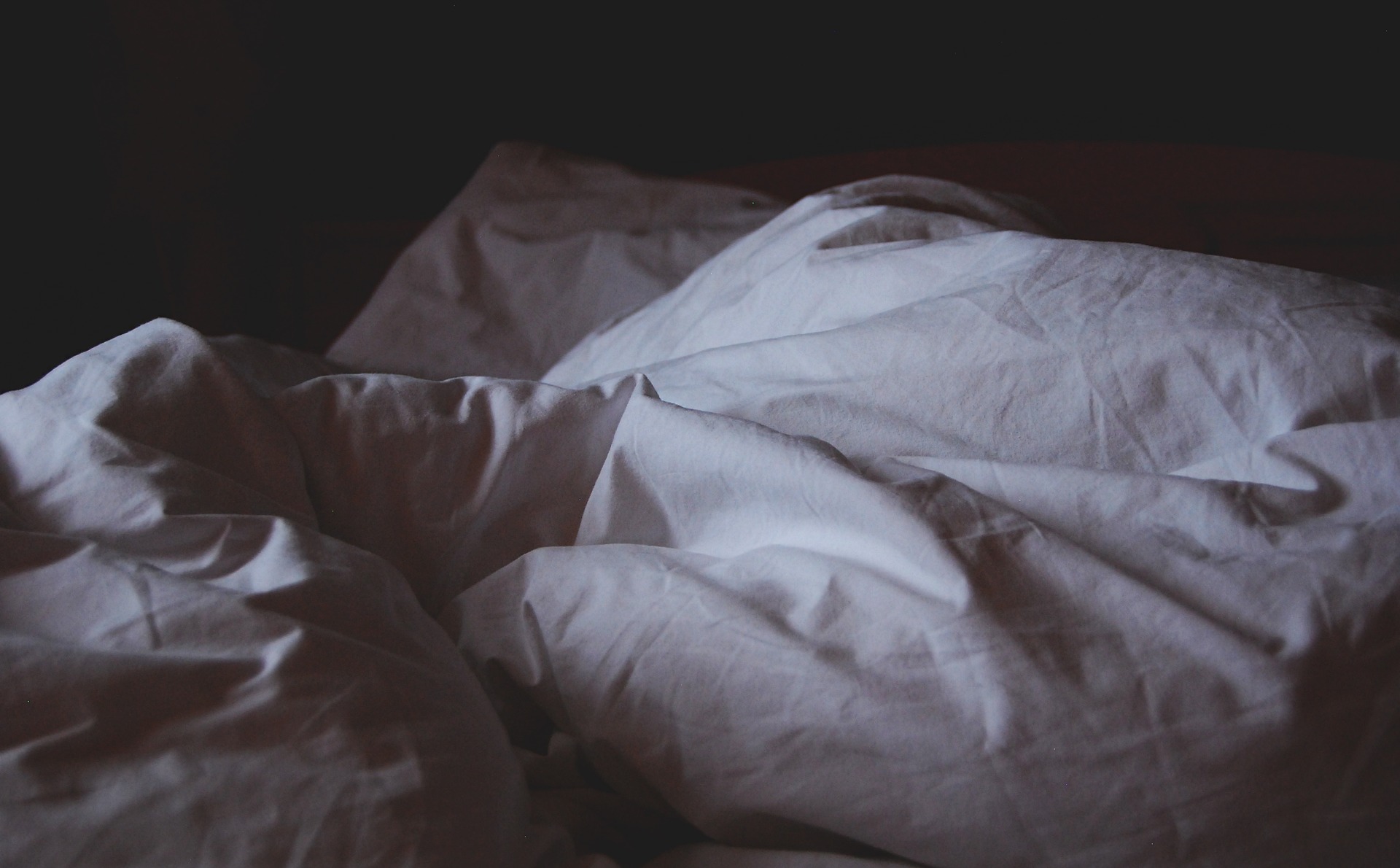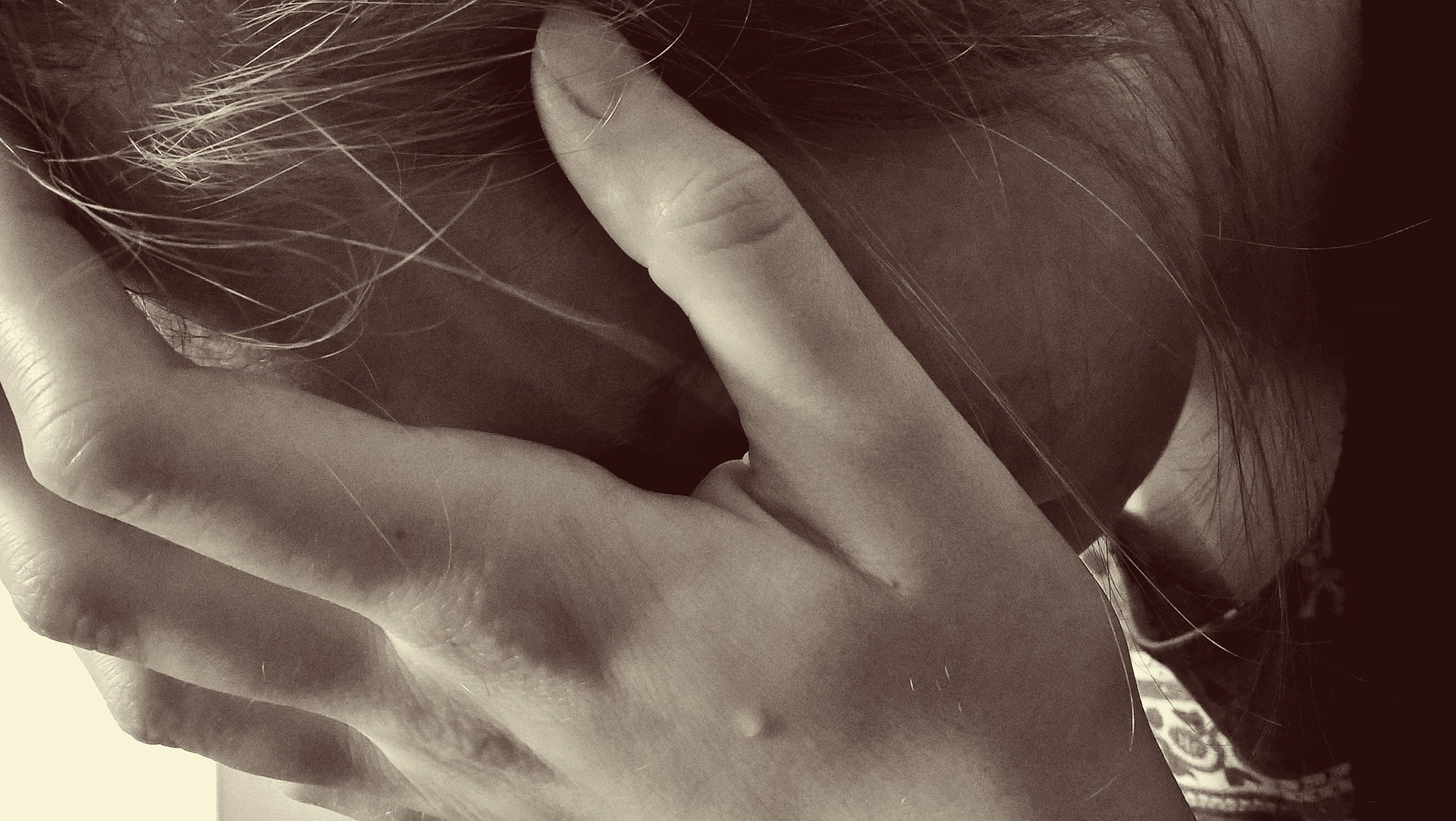
Waking Up Is Hard To Do: Why I Can’t Sleep
I watch the blades of the ceiling fan spinning around and around. I roll to my left and give Hubby’s face a gentle shove. He’s lightly snoring again. Inhale. Exhale. I roll back to my right and try to stretch out my leg. Kitty Girl lets out a disgruntled “merp” as I try to position my legs around her. She’s occupying my leg space again and apparently does not take kindly to being disturbed. The feline princess needs her beauty sleep.
Hubby shifts and starts to snore again. I roll back to my back so I can give him another nudge. My effort is unsuccessful in getting him to re-position himself. I use my foot and nudge a little harder this time. I roll back to my right. Kitty Girl hasn’t budged, so I try to bend my knees up around her. “The Wheels on The Bus” starts playing in my mind. My legs are bothering me—I need to move them. I roll back to my back and decide to try a breathing exercise I learned a few years back. Inhale—one. Exhale—two. Inhale—three. Exhale—four. Inhale—five. “I should write a post about playing the what-if game,” I think. Sentences start to swirl around in my mind.
Crap. I lost count of my breaths, and I’m uncomfortable again. Back to staring at the fan. More snoring coming from my left. My nudges and shoves are becoming less gentle. Kitty Girl has sprawled out and is lying perpendicular to me, but I need to put my legs there. I’m getting frustrated with being uncomfortable, so both her luck and my willingness to accommodate her has run out. She can either lie on top of my legs or move. Sorry, not sorry, Kitty Girl. When are those two Benadryl I took going to do their thing and make me drowsy? I glance at the clock—it’s 3:15 am. I’m awake for at least another forty-five minutes before I finally fall asleep.
Night Owl Tendencies
The scene I just played out for you describes a pretty typical night for me. Despite my best efforts, I really, really struggle to fall asleep at what most people would consider a “normal” time. Most nights, I spend a minimum of an hour awake in bed before my brain is willing to turn off. Only then do I succumb to sweet, sweet slumber. It’s exceedingly rare that I doze off before midnight—this pretty much only happens when I’m sick. But, usually, it’s quite a bit later than that.
Not being able to get to bed before midnight has really only been a significant problem a few times in my life. It wasn’t much of a big deal in high school or college. Pretty much everyone else was on the same late-to-bed schedule I was. How many college students do you know who actually liked having an 8:30 a.m. class (or worse, 8:00 a.m.)? How many showed up for it wearing something other than pajamas? My guess is: not many.
In graduate school, my late night tendencies only became problematic when I started doing clinical work. It wasn’t every day, though, so I managed to eke by. Even my first foray into the business world after graduate school wasn’t too greatly affected by my night owl tendencies. Did I feel like a zombie every morning on my drive to work? Absolutely. But the combination of lurking depression plus job stress plus an 8 1/2 hour work day plus another three to four hours of commute meant I was so exhausted that I occasionally went to bed at 8:00 p.m. Yeesh!
A Morning Person’s World
Everything changed when Little Man came into our lives, though. And I don’t mean the sleep disruption that is simply part of life with a newborn. Hubby and I both assumed screwy sleep patterns were just par for the course during Little Man’s first year. My night owl schedule really only became a significant problem once Little Man started regularly sleeping through the night. That may seem counterintuitive, so let me explain.
Before Little Man, I had a lot of freedom with my schedule. The traditional business world was definitely not for me (a topic for another time, perhaps), so I found a job that did not require me to work in the morning or commute very far. Hubby and I functioned independently as far as mornings and work were concerned. He got up and left for his traditional 9-to-5 job when he needed to. I slept until my body decided it was time to wake up, usually around 10:00 a.m. Easy peasy!
Times, They Are A-Changin’
Once Little Man entered our world, though, things were not so easy peasy anymore. All three of our respective schedules clash, and I am definitely the member of our family who suffers the most. I am extremely fortunate that Little Man is actually somewhat of a night owl as far as babies are concerned. But, his body’s clock is still set to an earlier sleep/wake schedule than mine. So, even though Hubby has the job with the traditional hours, I also have to try to align my sleep/wake times with his work schedule. That way I can take over caring for Little Man when Hubby needs to leave for work. I cannot overstate how incredibly much easier that is said than done.
Now, at this point you may be thinking, “Oh, she’s just complaining. Grow up and just wake up earlier. Go to bed earlier. It’s not that hard!” I assure you: it’s not that simple! Sleep is actually a complicated process. There is a lot going on in the body that determines when we fall asleep, how long we need to spend asleep, and when we’ll wake up. Describing the neurobiology of sleep in detail would probably be a post unto itself, so I’ll give you the short version here. (If you would like me to write such a post, please leave a comment below.)
How Sleep Works
In essence, our sleep/wake cycle is the result of two separate and opposing bodily forces:
- A biological drive to sleep, and
- A process that maintains alert wakefulness called clock-dependent alerting.
Clock-dependent alerting runs on a roughly 12-hour cycle and peaks twice per day: once in the morning, a few hours after waking, and again in the evening. The sleep drive, on the other hand, runs on a roughly 24-hour cycle that peaks in the late evening and is lowest in the morning. We fall asleep when the scales tip in favor of the sleep drive and it overtakes clock-dependent alerting. We awaken when clock-dependent alerting overpowers the sleep drive.* This is a simplistic explanation, but it’s sufficient to make my point.
Most adults experience peak alertness somewhere around 9:00 a.m. and 9:00 p.m., with the lowest alertness levels occurring around 3:00 a.m. (the middle of the night) and 3:00 p.m. (the afternoon slump). These people function just fine with a traditional business world job schedule. However, for some people, myself included (as well as most teens and college-aged young adults), peak alertness occurs several hours later. There is actually a clinical term for this condition: Delayed Sleep Phase Syndrome. And, let me tell you, it is really hard to function in the morning when your body’s clock is telling you that you should still be asleep. Furthermore, no amount of wishing, hoping, will power, or lying in a pitch dark room is going to make you be able to fall asleep when your internal clock is programmed to be AWAKE.
The Curse
Left to their own devices and schedules, Delayed Sleep Phase Syndrome people function just fine. This was me prior to Little Man’s arrival. And most of us can handle the occasional, isolated day or two where we don’t get enough sleep. But, when you try to force someone into a sleep/wake pattern that is out of alignment with their internal biological clock on a regular basis, chronic sleep deprivation results. If you’ve ever pulled an all-nighter after the age of twenty-five, or even if you’ve just stayed up much too late and weren’t able to sleep in the next morning, you know how much like complete and utter garbage it feels to be sleep deprived. It basically amounts to having jet lag all the time.
Think back to the last time you traveled somewhere in a completely different time zone than where you live. (This usually means international travel, or domestic travel from one side of a country to the other in a large territory like the United States.) How was your mood? Probably pretty crappy. How about your cognitive abilities? Were you able to think clearly, make good decisions, or process and remember information about your surroundings? Probably not. Were you irritable, indecisive, and operating in a dense mental fog? I like my odds on that last one!
Perpetual Jet Lag
Being unable to fall asleep and wake up at a “normal” time feels like living every day as though you’ve just moved from California to New York and your body hasn’t adjusted to the 3-hour time change yet. At least, it does for me.
Every weekday morning begins on a groggy and angry note. I pity the fool who tries to ask me a question before 11:00 a.m. and a minimum of two cups of coffee! The more tired I am, the less well I’m able to regulate my emotions during the day. So, I spend a good chunk of my time either feeling sad or trying to mitigate the effects of my fatigue-ignited short fuse. The most upsetting part of operating in a nearly constant mental fog is thinking that I’m not able to give Little Man my best each day simply because Hubby happens to have a 9:00 a.m. meeting.
Shifting Sleep Schedules
There are two main approaches to shifting night owls’ inherent sleep/wake cycle, but neither one is particularly practical to implement. The first method involves exposure to bright light first thing in the morning. It’s very similar to the treatment for Seasonal Affective Disorder (the clinical term for the winter blues).
Seeing The Light
Light plays a very important role in telling the body when to start and stop producing hormones that trigger sleep and wakefulness. (Light is, to use the fancy German term, a zeitgeber, which literally means: time giver.) I already do this to some extent. The lights in our bedroom are programmed to fade in gradually until they reach peak brightness at my ideal awakening time. However, normal light bulbs are nowhere near as bright as the sun. (It is about 200 times brighter outside on an overcast day than inside a typical residence.) Light therapy, to be effective, requires a special kind of lamp that mimics the brightness of the sun. Plus, you generally have to sit in front of it for 30 minutes to 1 hour every morning to receive any benefit. Ain’t nobody got time for that.
Rocking Around The Clock
The other strategy to shift a night owl’s biological clock to an earlier schedule is actually to go to bed progressively later each night. This probably seems counterintuitive. But, the only way to arrive at an earlier bedtime is by moving it around the clock, forward in time. Let me illustrate with an example.
To shift from falling asleep at midnight to falling asleep at 10:00 p.m., you can’t just go to bed two hours earlier. Your clock-dependent alerting cycle will prevent you from falling asleep. Instead, you have to gradually shift your bedtime to be 22 hours later. You achieve this by going to bed at 3:00 a.m. the first night. The second night, you go to bed at 6:00 a.m. The third night, you go to bed at 9:00 a.m. You keep going like this, shifting your bedtime by three hours each night, until you arrive at a final bedtime of 10:00 p.m.
Undertaking such a shift requires a significant time commitment and a completely uncluttered daily schedule (i.e., a “staycation”). It also requires the ability to create an environment that’s conducive to sleep (dark, quiet, no interruptions) at unconventional times while the shift is taking place. Between Little Man, Hubby’s job, and my own work, I don’t see this approach being feasible any time soon.
Parents, take note: your teenager is never going to be able to fall asleep at 9:00 or 10:00 p.m. It doesn’t matter how much you try to force it. They aren’t necessarily trying to defy you; their bodies simply aren’t programmed to fall asleep at the same time as yours.
The Takeaway
Alas. It seems I have few, if any, viable options for aligning my body’s internal clock with the rest of the world . Instead, I am destined to suffer the perpetual curse of being a night owl in a world built for morning people (for the foreseeable future, at least). That means I’m destined to be a groggy, slightly irritable mess if it’s before noon on any given day. So, if you’re ever in the Chicago area and you see me on the street, offer me a coffee. Chances are, I probably need it!
Notes:
*Although I learned this in both undergraduate and graduate school courses, I used the following book to refresh my memory (which you can find on Amazon):
Dement, W. C., & Vaughan, C. (1999). The promise of sleep. New York: Dell Publishing.







One Comment
Pingback: